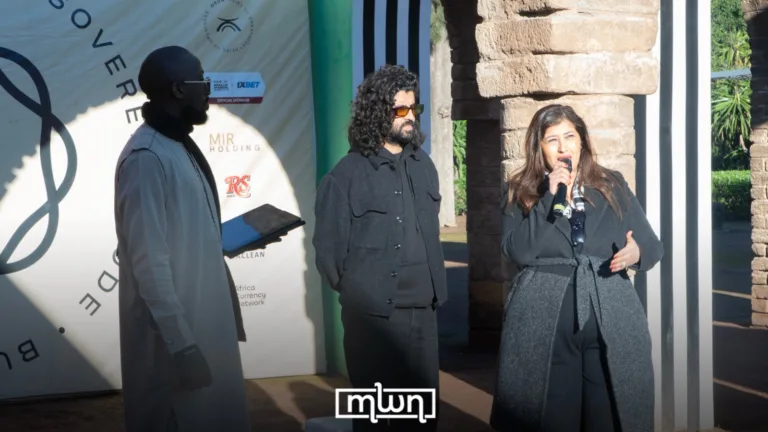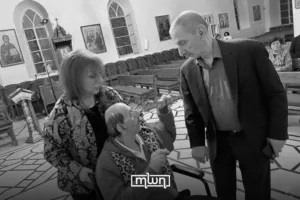The power of language provides us with a sense of belonging and understanding. Though language can connect us cross-culturally, the exchange of language without the context of a native speaker might lead to miscommunication.
In the polyglot of Morocco, where several different languages are spoken, more opportunities for miscommunication arise.
Of course, asking for paper or plastic, no milk or extra sugar in a foreign language will not pose any threat to our cross-cultural understanding. However, in discussion of larger-than-language concepts such as love, hate, and fear, words cannot fully contain the content of such subjects.
Between the participants of a conversation, one relies on social connotations and assumptions to relay our thoughts. Translating these concepts is no problem between native speakers who naturally assume them, but between languages, the mutual understanding of interlocutors remains uncharted territory.

These untranslatable concepts could potentially lead to miscommunication, resulting in the divergence between people of different cultures.
In consideration of this, one must acknowledge what gets left behind in conversation, and assume deeper conversations utilize assumptions not necessarily recognized cross-culturally.
This gap in our understanding (a.k.a the untranslated connotations and assumptions of certain words across languages) is what this study seeks to identify.
Documenting these cross-linguistic concepts will truthfully detail the assumptions we share and the assumptions we do not, and in light of these findings, we can see our divergences and better understand how to connect.
Interviewed were several locals and travelers of different ages, ethnicities, and genders, all responding in their preferred spoken language. These individuals were asked to discuss the opposite of love and then to define love, hate, and fear in their most intuitive ways. The findings were deeply nuanced, occasionally predictable, but predominantly confounding.

In the weeds
The interview began by asking participants “What is the opposite of love?”
“The opposite of love? Hate?” one responded.
“Hate, I think, yeah,” another said.
“…I don’t know, hatred, yes?” a third participant added.
Remarkably, across the six language profiles interviewed (Arabic, French, Spanish, English, Italian, and Korean), nearly every participant answered that hate was the opposite of love, perhaps suggesting a trans-linguistic understanding of these concepts.
In further investigation, however, there emerged a divergence in understanding.
Simply anointing love and hate as opposites was quite intuitive for participants, but when asked to define the concept of hate, answers diverged.
Throughout the interviews, it became clear the participants operated under different, personal assumptions.
Defined by the Oxford English Dictionary as an “intense dislike,” hate stands in staunch contrast to love, which is defined as an “intense feeling of deep affection.” Cross-culturally, these definitions tend to hold true.
Defining “hate” came as a mild challenge to the participants.

“I don’t know, when you don’t like being with or around someone? Yeah, that’s it,” one responded.
Another defined it as “a turbulent or quiet emotionally negative response to someone”
“Hate is the opposite of love, so, I would say it is to wish bad things to other people,” a participant explained.
For many, hatred was seen as fundamentally dependent on another person; it was something we felt to another, something caused by another, not necessarily in relation to the individual self or anything inanimate.
“… it’s a sort of negativity in a person, it is something that belongs to you when you hate someone,” one answered. “It remains in your area, it doesn’t affect the other one. So when you hate you lose… it is negative energy that you decide to possess.”
For others, hatred was a feeling. It was something internal and a fundamentally personal experience, not necessarily dependent on another.
“It’s the worst in this world. I feel like a bad person,” one said.

Another respondent explained that it is “a bad feeling.”
“If you hate someone you are hating yourself at the same time… and that gives you bad vibes and a sad mood without any reason,” they continued.
“It’s a feeling that describes envy and the opposite of well-being,” another one explained.
Among the various definitions, one thing universally agreed upon was that there was a negative connotation with “hate.”
Though superficially equivalent, the definitions began to diverge in individual meaning; some attributed hatred to a feeling, others to a practice or a state or being.
One thing is certain: participants did not define hate equally.
The matter became even more muddled in defining love. For most participants, defining love was nearly impossible.
“It’s really hard to find a definition of love, it is such a vague feeling. But love is to want to be the best for the other,” a respondent explained.
“I don’t know, it can be expressed in so many different ways and I can’t give an exact definition of it,” they elaborated. “That is how I think of love.”
“It is something you can’t explain, there is nothing like it, it is everybody, it is something precious…[it is] everything,” another one said.
“That’s a really deep question,” a third respondent said. “I don’t know how to explain it. I think that love is, like, the best feeling in the world.”
It was clear that love (across all languages) entailed too many nuances to be condensed into a definition.

Participants were frustrated with this challenge, worried they would lose some of love’s meaning in a not-all-inclusive definition. Those who found love too grand for words naturally encapsulated it in feelings, something distinguished from deliberate choices or practices.
Love for these people was a wash, something that comes over someone and something our person experiences, something uncontrollable and spontaneous.
People with this mindset frequently mentioned this feeling was to be experienced between two people, a provoking response considering the usual association with “feeling” to be exclusive to the individual self and body.
Love, in these cases, was a unique, extra-personal feeling that connected two individuals and was felt mutually between them. Without two to experience the feeling, the feeling of love would not take place.
“I don’t know, it is just a feeling with others, like my brother. I love him,” one person said. “This is the definition. When you love someone, you just share with him a feeling. That’s it for me”
Initially a beautiful sentiment, these thoughts suggest an absence of love without another to share it with, raising the question of “what is love when alone?”
A loneliness-prone definition of love emerges, one that disparages solitude, a definition of love dependent on the external. The beautiful facet is that this definition is driven by intimacy, a mental framework illuminating intrapersonal connection above all else.
For others, love was identified not through shared feelings, but through its practical usage in society. One American participant acknowledged love’s modern capitalization.
Love was not described as a feeling, but a romanticized ideal utilized for marketing strategies.
“It’s really hard to say because I feel love is used in so many ways now in society. It’s used as a corporate pathway for marketing, like body love, it is used as a marketing tactic; it is romanticized,” the participant explained.
“There is a reason why the diamond industry is a billion-dollar industry; we associate humans’ meaning with objects and other things thinking that love is everything,” they continued.
“Love,” in the act of being defined, naturally becomes skewed by the market. These influenced views of love prey on our desire for connection and capitalize on the lack-there-of.
Many in these environments are confused about what love truly is outside a capital framework, and the lack of a common understanding of love allows for the manipulation of its meaning.
Love’s definition becomes altered to the needs of the user. In environments like this, love’s mystique is used to a capitalistic advantage.
As one can see, that mystique obscures people’s understanding, with some people blatantly embracing the idea that love is beyond all definitions. Some participants, however, took a definitive approach to the definition challenge.
“Love is harmony and unification,” one said.
“It’s a human feeling. It’s a human necessity,” another expressed.
Love to many was an undefined blissful experience, one of unity and harmony, something natural and necessary. Love for others was a deliberate practice, an active and perpetual decision to do and act on.
In conversation with a new father, he opened up about his views on a long-lasting love, a rare and intimate dialogue between two strangers.
“[Love is] respect, yes. Respect. Because love as admiration is not something that is permanent. It disappears with time,” he explained. “But respect, when we have respect in a relationship it can make the relationship more sustainable, it can go in further ways and the couple can survive true problems, all the stuff that occurs in our daily life. That is it”
From a newlywed woman, one can see a similar perspective:
“Love is having someone who respects you, and who is by your side whenever you need them, and who is there for you, and accepts you for who you are, and helps you better yourself,” she said.
Respect was a common thread among Moroccan locals and a notion only occasionally mentioned by travelers.
Those who associated Love with respect also acknowledged life’s tendency to change over time. It was acknowledged that circumstances, environments, and personalities evolve, and respect was identified as the structure that maintained connection and affection between persons through such changes.
To respect one another’s time, person, life, and values as well as the relationship holistically was the strength of love. For many Moroccan participants, it was the foundation of love, an inseparable and defining aspect of the concept.
There is something deeper to be acknowledged about a definition of love that is fundamentally structured on respect.
It is a definition that requires personal attention, a deliberate effort, and phenomena requiring accountability. Distinguished from feelings and sensations, this definition of love asks for an intellectual approach, an activity to pursue.
This definition dwarfs affection and emphasizes effort and action. Love, as described by several participants with this view, was found in consistency and being present, not in mere sensations.
Participants were surprised at the presence of “fear” in this study, many found it to be unrelated to the topic at hand.
Despite being asked after love and hate, many definitions of fear were crafted outside of the contexts of “love” and “hate” altogether. Most participants presented the same befuddlement in defining fear as they did in defining hate and love.
“It’s a bad thing,” one said. “It makes you feel uncomfortable… I don’t know”
“Fear, yeah, I think there is no specific definition of it but I think it’s when you fear something you just with the worst of something like that, yes this is for me the fear,” another elaborated.
In most cases, definitions of fear were Indistinguishable from definitions of hate.
“Fear is [to be] hurt…[it is a] poor, bad feeling, tough situations,” a participant argued.
“[It is] so bad… it’s very awful to feel,” one expressed.
Throughout the collection of interviews, however, people began to present more in-depth acknowledgments of fear.
“Fear is the enemy of everybody. It’s our enemy,” a respondent said.
“…Fear is when you don’t want to get near anything and it can be moral fear or physical fear of so many things,” another one responded.
An interviewee said that “it’s being afraid to make a mistake, or to let people down, or to, I don’t know, just do something wrong.”
“It’s just being scared of the unknown,” one said. “Just not knowing what’s coming.”
Fear, similar to hatred, was associated with feelings of negativity.
This concept, however, was used with connotations of being scared, wrong, and living in the unknown. Commonly, definitions of fear seemed to not be in relation to either love or hate.
Against the grain, however, a father and special-needs activist intuitively drew the connection between love and fear.
“Defining fear, of course, it’s a feeling. If we don’t have the feeling of fear, we can’t get our goals, our objectives,” he said. “So that’s a part of our life, too. A fusion of love and fear will be the best. We can’t live with saying that we share love [if] we don’t feel the other feelings like fear in our life.”
Fear in this understanding compliments love, it is seen as love’s natural counterpart. The more love one incorporates into life, the more fear naturally accumulates.
Read Also: Spain-Morocco and Valentine’s Day: Day of Love, Day of Hate
Love asks us to be vulnerable, and the more we love the more open we are to loss and pain. One cannot love without the possibility of pain, and the more one loves, the more one will suffer loss.
As an old woman explains, “Everyone gets scared, we are scared of death, scared to lose someone dear to us – parents and children, we lose a job, if we lose something important to us.”
Fear, in this sense, is the underside of love; the response to love’s absence and the state we exist in without love’s comforts and stability.
In spite of popular definitions, perhaps fear is love’s natural antithesis.
In consideration
Facing the meaning of our words posed a great challenge to all people, of all different ages, genders, and nationalities. In reviewing these interviews, one can see the individual having their own take on the concepts.
Across languages, many definitions were similar in connotation, but upon further analysis, all people used the words with various assumptions. These variances did not seem to be because of the language, but rather because of the individual.
Each person, in their own experiences and preferences, had formulated different understandings of the words. In recognition of this, it would be inaccurate to attest interpersonal misunderstandings of love, hate, and fear to be solely because of language barriers; it would be more reflective to suggest it is because of different personal experiences and personal identities.
Even when condensing the definitions of love, hate, and fear, because of their various understandings, their concepts remain broad.
This study began with hopes of bringing brevity to these concepts, but perhaps what should be considered is not how to define these words, but how individuals come to acknowledge them, both personally and in practice.
The study brings forth the possibility that attempting to define these concepts is irrelevant, as individuals will always have their own definitions and understandings, and perhaps acknowledging individual differences is the most effective method of connection.
The study also brings forward the possibility that attempting to craft an all-encompassing definition of these words will come at the expense of one’s own definition: an expression of identity, the self built from experience, a declaration of the way one sees love, hate, and fear, and a method to find people of similar demeanors.
Perhaps the unifying definition, in an attempt to connect us, will separate us from ourselves, from our expression of the world and our experiences, and the way in which we chose to pursue like-minded individuals.
In spite of definitions (or lack thereof), love, hate, and fear will only be what one makes of them, and perhaps the choice to decide what these words mean is what brings people together.
















